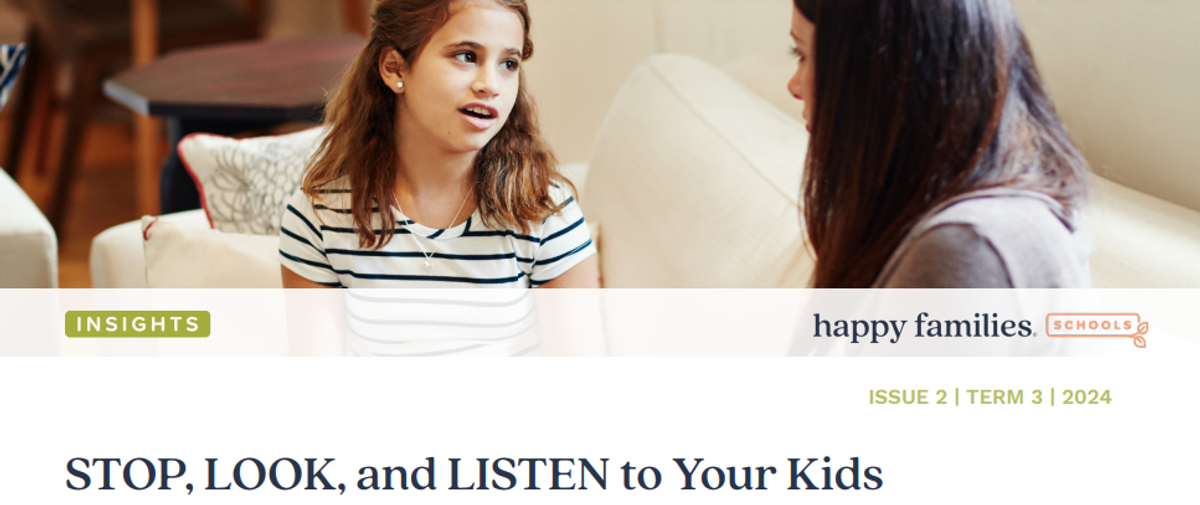Parent Partnerships

Some years ago I came across a parenting questionnaire developed by thoughtful, careful researchers. One of the questionnaire items asked, “Do you stop and pay attention to your child when your child wants/needs you?” As a parenting expert I knew there could only be one answer. “Yes, of course I do,” I told myself.
The question got under my skin a little bit though, for two reasons. First, I knew deep down that my answer wasn’t entirely honest. But second, am I supposed to stop what I’m doing every time my child needs me and pay attention? I’ll never get anything done! And won’t that spoil my child, creating an entitled little empress who thinks I’m only there to do her bidding?
I spoke to my wife, Kylie, and asked her what she thought. “I know I’m supposed to always be there, and I’d like to say I am… but I’m probably not” was her reply. She added, “Is it even realistic?”
That night, Kylie sat with our children and asked them if they believed that we were always there for them, ready to listen and pay attention when they wanted us. The answers surprised us, none more so than this from our (then) 7-year-old daughter:
“When you are busy you don’t listen to me properly. Like when Dad’s on the computer or you (mum) are doing craft you’re not available to me. It feels like those things are more important than me.” She added, “Even when you say you’re listening to me, you’re not, because you’re not focused on me. You keep doing what you were doing.”
Ouch!
Stop, Look, and Listen
When we cross the road, we stop, look, and listen. It helps us navigate a physically hazardous or challenging situation. Relationships with our children can be like crossing the road. If we aren’t willing to stop, look, and listen, we may miss something important heading our way, and we, or our child, or even our whole family, could get hit by it. Perhaps it is a friendship challenge, an issue at school, or a toddler feeling like she needs to be comforted. Maybe it’s a teen who is thinking about doing something unsafe with drugs or sex. Or it could be as simple as a child who wants—needs—to be seen but doesn’t know how to communicate that need.
Play the Long Game
So will stopping and paying attention to our children make life easier? Or will it just lead to more interruptions and selfish children?
Researchers have uncovered a surprising finding. Children whose parents are willing to stop, look, and listen tend to become less needy. These children learn over time that when they need their parents, they’ll be there. They feel secure in that relationship. Conversely, children who have parents who push them away, say, “not now”, or tell them to “hurry up” all the time worry about whether their parents will be available and they become more needy.
When our child wants us, it can be easy to pretend to be listening while we continue scrolling on Instagram. We might even turn our body and shoulders towards our child and mumble “uh-huh” as they tell us about their day or whine about their sibling. But, as my daughter so poignantly pointed out in her interview with her mum, we’re not really listening. And that leads them to act in ways that demand our attention… but it’s not really the kind they want.
By giving your full focus to your child, you are also teaching them how to have present and meaningful conversations with friends and other family members!
How does it feel for you?
Perhaps you have talked with a spouse or partner, or a friend, and they’ve been distracted while you poured out your heart. Chances are you felt frustrated. Perhaps you even felt that you could not trust that person with your challenges and vulnerabilities? Our children feel the same way.
To build strong, trusting relationships with our children the simplest things we can do is this:
- STOP. Stop what you are doing. Completely. Put down the phone. Turn away from the screen. Turn down the stove. (But keep your eyes on the road if you’re driving!)
- LOOK. Look at your child – in the eyes. You might crouch down so you can hold hands. Make that visual connection.
- LISTEN. Keep that mouth zipped. Just listen. Keep looking at your child and really pay attention.
(This works for spouses and partners too.)
Just as dollars are the currency of our economy, attention is the currency of our relationships. Too often our relationships are in the red. We are not giving them enough attention – or the right attention, and it dilutes our ability to help our children.
Really stop, sincerely look, actively listen, and observe how much better family life feels.


